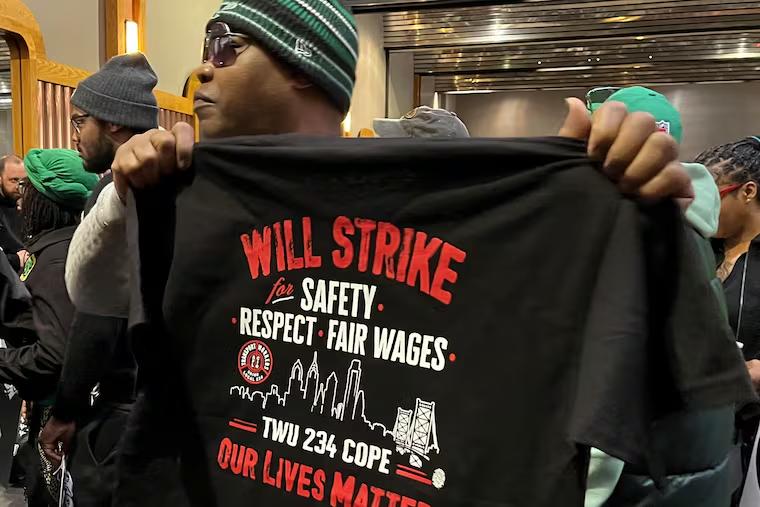SEPTA’s largest employee union votes to authorize a strike

A booming roar rose behind closed doors as Transport Workers Union Local 234, SEPTA’s largest, voted on Sunday to authorize leaders to call a strike if needed during contract negotiations.
“I am proud of my members. I am proud that they believe in me. I believe in them,” said Will Vera, who was elected president of Local 234 in October.
He told reporters he was not close to calling a strike, but the unanimous vote gives him leverage at the table. Early talks between the union and SEPTA have been cordial, Vera said, but “we all know things can change at any moment.”
The 5,000-member local represents bus, subway, and trolley operators, mechanics, cashiers, maintenance people, and custodians, primarily in the city.
Local 234’s latest contract expired Nov. 7. Vera delayed seeking strike authorization as SEPTA’s new chief labor-relations officer arrived and amid uncertainty over new operating money for transit agencies in the state budget. Lawmakers wrapped the $50.1 billion budget Wednesday without any such money.
» READ MORE: No funding for SEPTA in Pa.’s $50.1 billion budget is another ‘disappointing’ blow for the agency
The two sides are scheduled to meet Tuesday.
The union says it is looking for a two-year deal with raises and changes to what it views as onerous work rules, including the transit agency’s use of a third party that Vera said makes it hard for members to use their allotted sick time.
“There’s a lot of things in these contracts that have been put in since the ’40s, the ’50s, the ’60s, and now I’ve been given an opportunity to change this,” said Vera, who has been in the local’s leadership for 12 years before becoming president.
Three TWU contracts in a row have run for one year each, all negotiated as SEPTA weathered what it has called the worst period of financial turmoil in its history.
In a statement, SEPTA said it was aware of the authorization vote and is committed “to continue to engage in good-faith negotiations, with the goal of reaching a new agreement that is fair.”
SEPTA officials have signaled they are open to a two-year deal as a step toward labor stability.
After state Senate Republicans killed funding for SEPTA and other transit agencies in the budget, Democratic Gov. Josh Shapiro authorized SEPTA to divert up to $394 million in state money reserved for capital projects to pay daily expenses for two years.
The move did not require legislative approval.
“If SEPTA doesn’t put money on the table, we’re going to shut Philly down,” said John Samuelsen of Brooklyn, N.Y., TWU’s international president. “That’s what’s going to happen.” He noted that union members from New York City would walk picket lines with Local 234 in the event of a walkout.
SEPTA unions have walked off the job at least 12 times since 1975, earning the authority a reputation as the most strike-prone big transit agency in the U.S.
“SEPTA really needs to pay, and we’re sick and tired of coming to work under poor work-rule conditions,” said Lyle Smith, an 18-year employee who is a body mechanic working on buses but was a trolley operator most of his career.
“They want to walk you out the door as soon as you get hired,” Smith said.
In the last days of talks in Harrisburg over the state budget, which was finalized four months past the legal deadline, there had been talk of a plan to tax online sports betting as well as skill games, pseudo slot machines that are unregulated and untaxed, for transit.
That plan evaporated, as have all proposals in the past three years to help the state’s transit agencies with more money.





